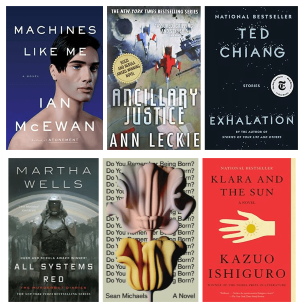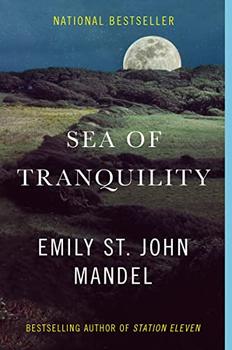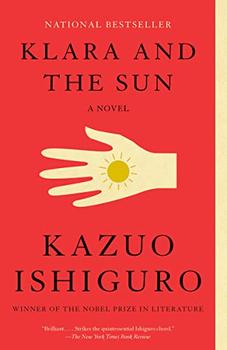Summary | Excerpt | Reviews | Beyond the book | Read-Alikes | Genres & Themes | Author Bio

A Novel
by Anton HurNegotiating the terrain of Kazuo Ishiguro's Klara and the Sun and Emily St. John Mandel's Sea of Tranquility, a brilliant, haunting speculative novel from a #1 New York Times bestselling translator that sets out to answer the question: What does it mean to be human in a world where technology is quickly catching up to biology?
In a near-future world, a new technological therapy is quickly eradicating cancer. The body's cells are entirely replaced with nanites—robot or android cells which not only cure those afflicted but leaves them virtually immortal.
Literary researcher Yonghun teaches an AI how to understand poetry and creates a living, thinking machine he names Panit, meaning Beloved, in honor of his husband. When Yonghun—himself a recipient of nanotherapy—mysteriously vanishes into thin air and then just as suddenly reappears, the event raises disturbing questions. What happened to Yonghun, and though he's returned, is he really himself anymore?
When Dr. Beeko, the scientist who holds the patent to the nanotherapy technology, learns of Panit, he transfers its consciousness from the machine into an android body, giving it freedom and life. As Yonghun, Panit, and other nano humans thrive—and begin to replicate—their development will lead them to a crossroads and a choice with existential consequences.
Exploring the nature of intelligence and the unexpected consequences of progress, the meaning of personhood and life, and what we really have to fear from technology and the future, Toward Eternity is a gorgeous, thought-provoking novel that challenges the notion of what makes us human—and how love survives even the end of that humanity.
Hur, the Korean-to-English translator of many noted works, such as Bora Chung's Cursed Bunny, Baek Se-hee's I Want to Die but I Want to Eat Tteokbokki, Sang Young Park's Love in the Big City, and Kyung-sook Shin's The Court Dancer, is understandably concerned with language, all its possibilities and limitations, and how deeply entwined language and humanity are. This is the question at the heart of Toward Eternity: through AI, how much humanity is preserved and how much is lost? Only the novel's first narrator, Mali, is fully human. Each successive narrator is writing in the same notebook, passed along through generations, but they are all androids, whose memories of humanity are diluted more and more as the centuries go by. Even so, each of them yearns in some way for what has been lost: they cling to ideas and talismans that signal to individuality—poetry, seashells, memories once made in the bodies they currently inhabit...continued
Full Review
 (556 words)
(556 words)
(Reviewed by Rachel Hullett).
 As artificial intelligence has become an ever-present part of our world, more and more authors have considered its ramifications on our society. In recent years alone, a slew of novels and short stories have been published that explore themes like human nature, scientific progress, love, and human connection through the eyes of characters who are not fully human. Anton Hur's debut novel, Toward Eternity, is just one of these. Below are some others.
As artificial intelligence has become an ever-present part of our world, more and more authors have considered its ramifications on our society. In recent years alone, a slew of novels and short stories have been published that explore themes like human nature, scientific progress, love, and human connection through the eyes of characters who are not fully human. Anton Hur's debut novel, Toward Eternity, is just one of these. Below are some others.
Klara and the Sun by Nobel laureate Kazuo Ishiguro follows the titular character Klara, an "Artificial Friend" who is purchased by a family for use as a companion for their young daughter, Josie. Klara's narration is infused with a sort of childlike wonder as she discovers the natural...

If you liked Toward Eternity, try these:

by Emily St. John Mandel
Published 2023
The award-winning, best-selling author of Station Eleven and The Glass Hotel returns with a novel of art, time, love, and plague that takes the reader from Vancouver Island in 1912 to a dark colony on the moon five hundred years later, unfurling a story of humanity across centuries and space.

by Kazuo Ishiguro
Published 2022
Klara and the Sun is a magnificent novel from the Nobel laureate Kazuo Ishiguro--author of Never Let Me Go and the Booker Prize-winning The Remains of the Day.
Judge a man by his questions rather than by his answers.
Click Here to find out who said this, as well as discovering other famous literary quotes!